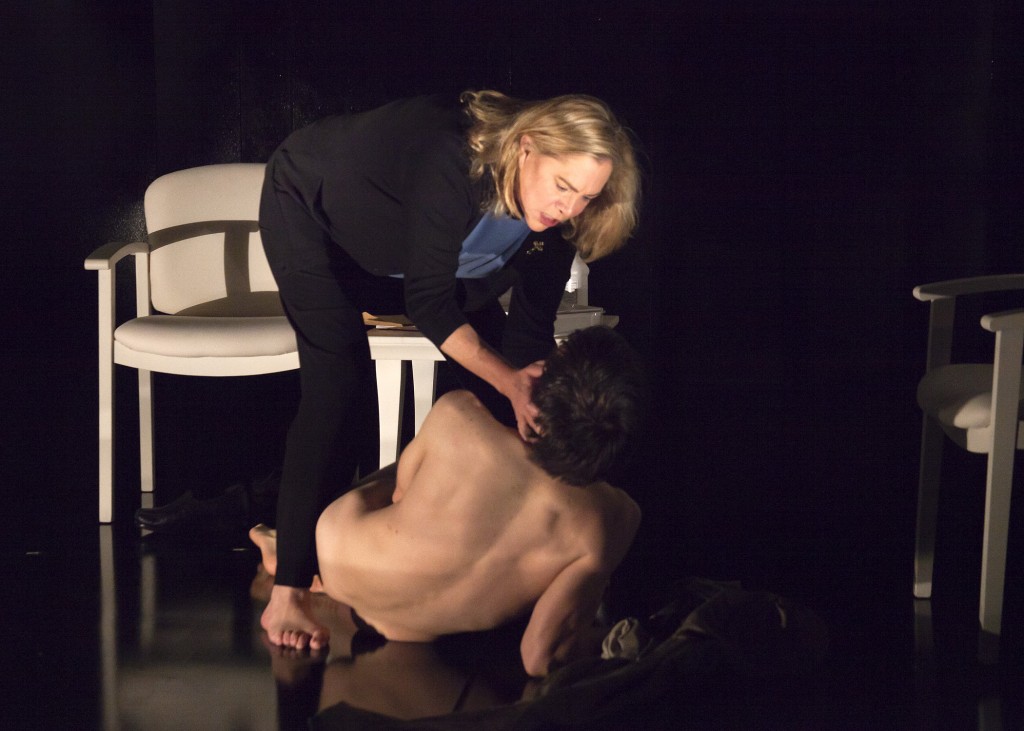
Kathleen Turner as the foul-mouthed recovering alcoholic nun trying to help an addict / Photos courtesy of Hartford TheatreWorks
By Bill Hirschman
It was surreal even by theater standards: Matthew Lombardo’s drama about addiction High had broken box office records in its world premiere at Hartford’s TheaterWorks. It received strong reviews in its pre-Broadway shakedown in Cincinnati. The star, Kathleen Turner as a foul-mouthed recovering alcoholic nun, was cheered at the next stop in St. Louis.
And here they were, on opening night on Broadway in April 2011, already certain in the knowledge that the production was doomed.
“I knew on opening night that we would be closing soon. That’s the worst opening night you can have,” the playwright recalls.
Generally lambasted by New York critics and under-advertised in the pre-Tony crush of openings, High shuttered after 8 performances. It was the humiliating crash and burn of the season.
But it wasn’t the end.
Convinced of the script’s worth as profanely funny, harrowing and illuminating theater, Lombardo met with Turner and co-star Evan Jonigkeit while the wreckage was still white hot.
“I said… ‘What do you think? Should we do it some more?’ With everything we went through, Kathleen could have said, ‘OK, I’m done,’ but she said, ‘No, I want to continue. I love this play. I believe in this play and I want to play this character and allow as many people to see it as possible…. This play is too important to stop now.’ ”
All of them, plus director Rob Ruggerio had become true believers in the entertainment and inspirational value of this tale of a backsliding nun’s attempt to rescue a young addict in a faith-based program, a dramatic odyssey leavened by considerable black humor. They believed the problems were not with the script or the production but with critical antipathy and fiscal decisions by some of the producers.
The result goes on display next week at Parker Playhouse, the second stop on High’s resurrection tour – this time co-produced by Lombardo.
For Lombardo, the impetus went far beyond vanity. This work was far more personal than his smash hit of Tea at Five about Katharine Hepburn and qualified success with Looped about Tallulah Bankhead.
High’s arc through the horrors of addiction and the possibility of redemption were excavated from his guts. Affable and clean cut today as he munches a hamburger at an Oakland Park diner, the sometime Fort Lauderdale resident cheerfully admits to a hellish seven years of his life when he, too, was an addict.
As he writes in the essay, Coming Clean, “On the afternoon of June 2, 2007, I woke up in a filthy and disreputable hotel room on 43rd Street in Manhattan. The lower half of my body was lying on a floor mattress while my upper torso and head was face down on the soiled, multi-cigarette burned carpet. Sleeping next to me was my then boyfriend-slash-drug dealer — a man as tortured as he was beautiful –a trail of bloody syringes, matches, and some empty crack baggies separating the two of us in bed.”
The details of the plot for High are not strictly autobiographical, he said, but “the resentment, the unworthiness, all those feelings that I went through, I used to create the character of Cody, but our histories are totally different. I structured Cody from a lot of people I met when I was out there using. And I’m kind of trying to tell their story. They don’t have a voice.”
Another unusual facet is the positive role that he has assigned faith as a possible avenue of recovery. “If you look at the American Medical Association, they say there is no cure for alcoholism and addiction. But there is a treatment. And that treatment is the 12 steps of Alcoholics Anonymous. Now the 12 steps of AA is nothing more than a faith-based program, believing in a power greater than yourself. So the American Medical Association is actually saying that if you believe in God, you can be cured. I find that fascinating.”
One reason that the supporters can’t let the show die has been the audience reaction. “We constantly get cards, letters, emails, text messages, Facebook posts from people all over the country who were touched in so many different ways and they all share their stories about alcoholism and addiction,” Lombardo said.
The most direct feedback came from talkback sessions after the performances, he recalls. “A grandmother raises her hand and says, ‘My grandson is a heroin addict; how do I help him?’ Or an alcoholic with 40 years of sobriety stands up and speaks. It’s giving people a voice and a platform to talk openly without shame.”
The one incident he can’t shake occurred in Hartford. “A man came up to me after the show and he said, ‘Congratulations on your sobriety. My 16-year-old brother wasn’t as lucky.’ He was so grateful that I was able to share. He said, ‘I gotta be honest with you: It was hard sitting there, but it was the best experience of my life because I know my brother’s experience was not in vain’.”
It validated a long creative process that almost didn’t begin. “I actually didn’t want to write this play because I was afraid I would have to sit in interviews like this and have to go over my story over and over and over. So I kind of suppressed it, but it kept kind of gnawing at me. And I thought, well, I have to let this come out in some way because from every experience there is a gift in every challenge.
“Even as I was writing it, I wasn’t sure I was going to show it to anybody or even have it produced…. But the more I worked on it, the more I thought there’s really something here that I need to share with people because my personal experience could help others understanding of dealing with alcoholics and addiction, mostly for people who have loved ones who have struggled with this disease.”
Lunch is forgotten as the fervor takes over. “I want people to see what my family went through with me and know how to help. Because I think a lot of people don’t understand that alcoholism and addiction are a disease. It’s the only disease that people get mad at you for having. If I had said I had cancer or diabetes, I would have been met with more compassion, but I wanted to tell it like it is, in a very raw unfiltered vehicle.”
As the script evolved, he began thinking of the realities of show business, especially the ability of star power to sell a play as Kate Mulgrew’s name has done for Tea at Five and Valerie Harper had done for Looped.
“When I was writing this play, I wanted a Kathleen Turner type. And the more confident I got, the more I went, ‘I don’t want a Kathleen Turner type, I want Kathleen Turner.’ So I called her agent and said, ‘I’ve got a role for her and it’s something she’s never done before and I’ll bet she will not say no.’ And a week later, we were at Joe Allen’s and I’m sitting across from Kathleen Turner.”
Turner is best known across the country for iconic screen roles in Body Heat and The Jewel of the Nile. But Broadway audiences know her acting chops scorched stages with her performances in Who’s Afraid of Virginia Woolf and Cat on a Hot Tin Roof.
“But she doesn’t go into things lightly. She saw what I was trying to do and she said, ‘OK, let me help you go further.’ And she gave me suggestions and she gave me good notes… I custom tailored it to Kathleen. There are certain rhythms of her speech that I would write for. She’s an amazingly intelligent, she might come and say, ‘If I take one word out of this line, it’ll get a laugh.’ And she’s always right.”
It’s also a special opportunity for Turner. “What she loved about this was adding to the library of plays, originating a role. Instead of playing a role that a lot of other actresses have played, she’s creating a role. Her performance would be the foundation of any other production out there. So it’s the greatest gift for her,” Lombardo said.
Lombardo is an inveterate rewriter, so along the road, he tweaked the show based on audience reaction after Hartford, Cincinnati and St. Louis. Eventually, he and Turner were proud of the script that they took to New York.
And then came the bow at the Booth Theater off Times Square. The audiences who came were moved, but not a lot of people came. Critics praised Turner, but didn’t cotton to the play, some questioning the credibility of the “sensationalized” depths of the pit that Lombardo weaves into the addict’s backstory.
“I can tell you from personal experience, especially in the last two years of my active addiction, I have come across so many Cody Randalls in my travels who were sexually abused, who were kicked out of the house for being gay, who had to prostitute themselves at 13, who became dealers by the time they were 16. Especially down in South Florida, this is a reality. So, for anyone to say this character doesn’t exist is being ignorant.”
As a result, he was not fazed too seriously. “I have a certain way of writing and I have a certain audience. So sometimes these plays are critic proof, which doesn’t exactly make critics happy.”
On the other hand, he said, “when we went into rehearsal for the tour… because we had all been away from it for six months, coming back to it we discovered a bit more about the characters and the situation. So I went back and did a little more rewriting. I can tell you even with Tea at Five, I rewrote in every city because I’ve been blessed to work with extraordinary actresses who want to continue to explore the character and keep peeling the layers away from that onion to get to that core and Kathleen is exactly like that.”
Going forward, Lombardo is working a new play but his attention is focused as a co-producer of this tour, which moves to San Francisco and other cities this spring. High is already running in Venezuela, the play has been optioned for a possible treatment as a movie, and there’s talk about the tour going to Australia and London. So, playwriting has to go on the back burner for a few more months.
“This is most rewarding thing that has happened to me in my life and I really want to focus on it.”
High plays Feb. 29 to March 4 at Parker Playhouse, 707 NE Eighth Street in Holiday Park, Fort Lauderdale. Performances are 8 p.m. Wednesday-Saturday, 2 p.m. Saturday-Sunday, 7 p.m. Sunday. Tickets are $46.50 – $66.50. Call (954) 462- 0222 or visit www.parkerplayhouse.com
For a promotional video, click here.
To read Lombardo’s essay Coming Clean, click here.











 A PaperStreet Web Design
A PaperStreet Web Design
